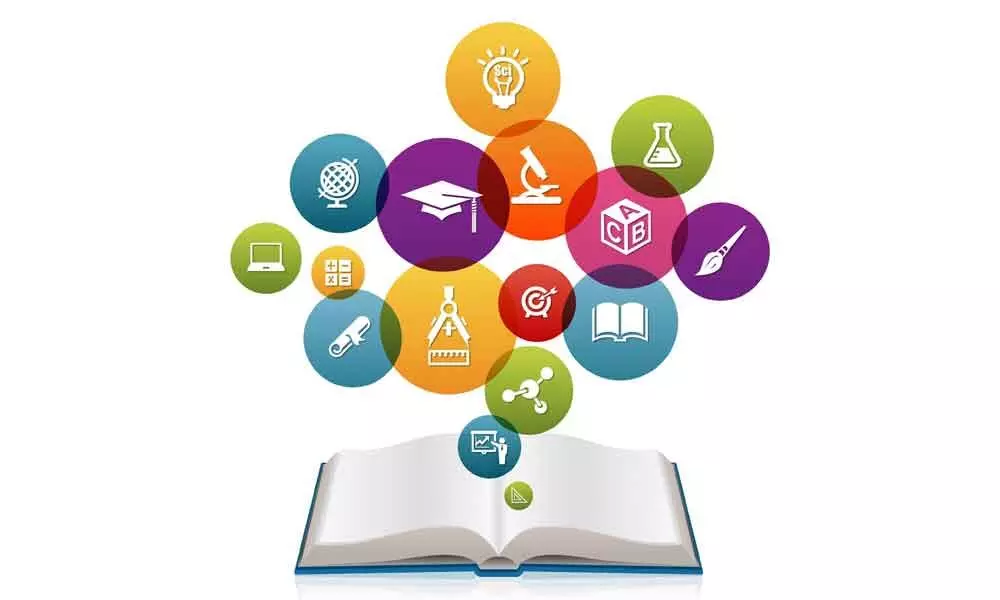What ails higher education?

"Education is a wonderful thing. It is good, if every school has it" said an English academician sarcastically.
"Education is a wonderful thing. It is good, if every school has it" said an English academician sarcastically. In a subtle manner he has indicated that most schools, colleges, and universities do not have what we call education.
Every time a big seminar or a national debate is held on the Higher Education System academicians, leaders, and policy planners and other invitees discuss the topic threadbare dissect each problem plaguing the system, offer often impractical and half baked solutions to the problems and leave the venue complacently! Of course some of them, who are really serious about improving the education system, do carry out the follow up action, meet our authorities concerned, and beg them to do the needful to improve the system. But alas in spite of their sincere and well intended efforts, the system more or less remains the same or gets some half hearted and cosmetic touches here and there! Why this happens? what is the root cause for the maladies? How to treat them, and make the system whole?
We know that in a narrow sense, the Higher Education System includes colleges and universities and the activities like instruction and imparting of knowledge and skills and research work carried on at these places.
In a broad sense, the word college includes medical and agricultural institutions, Management Schools offering BBA, MBA courses, music and vocational institutes offering degree courses.
The demand for courses offered in the institutions is largely market-driven. Once B.com was in huge demand, later humanities and Economics in particular topped the list.
It is a pity that the quality of education imparted in most of these institutions is of mediocre class or just above average. Most teachers working here are not well trained, not very knowledgeable in their respective fields, follow age old methods of teaching and rarely update their knowledge about developments occurred in their areas of activity.
Some of these teachers carry out research in their fields only for their monetary benefits and them seldom apply their newly obtained skills and knowledge in the classroom teaching. To correct this anomaly, the UGC has made it mandatory for university and college teachers to attend two Orientation Courses and three Refresher Courses in their service period.
It is true that attending these courses give the teachers not only monetary benefits in the form of increments, but also a chance to interact with seasoned Resource Persons and update their knowledge.
While attending these courses, what I noticed was that most participants at these courses showed little interest in the proceedings and in the interactions with the RPs. Nobody is bothered to oversee what the participants learnt in these courses and whether they used their learning later in the classroom. Hence there is no improvement either in the quality of education imparted or in the teaching methods of teachers. The nature of syllabus, examination pattern and the number of students in each class and their participation in the classroom proceedings also decide the quality of education in these institutions.
Again most of these institutions do not have proper infrastructure in the form of classroom buildings, modern labs, and student friendly libraries. Even our Central Universities face these problems and the Central University at Anantapur is a basket case here. Again the UGC comes into the picture when it gives out huge funds for acquiring these essential things. But alas here also the lack of proper supervision defeats the very purpose of providing the funds. In most college labs, the equipment items are mostly outdated, new and costly items are hardly maintained and rarely used by and for students. The less we talk about college libraries and the books therein, the better. The books often purchased with the UGC funds are Reference books and other books and magazines are not always loaned to students because in most colleges, students are asked to return them when they need them most e before exams. Though the UGC is very particular about making the digital and normal libraries available for students' use round the clock only a few universities and colleges follow these guidelines. In other words, the non-availability of books and student unfriendly librarians speak ill of our Higher Education.
Research output is another vital aspect in Higher Education System. A look at the number of PhDs our universities produce every year and the quality of research done tells us where we stand in terms of global quality and quantity standards. We are way behind many countries in producing quality P.hds. Long ago China surpassed India in this aspect and these days it has even surpassed the USA in producing P.hds in Medicine.
The NEP 2020 is intended on one hand to correct all these anomalies and maladies in our about1400 universities and 40,000 colleges. On the other, the Policy ambitiously aims at giving these institutions a global look and internationalizes their appeal. The UGC is working on full steam to achieve our goals like allowing foreign universities into India permitting our institutions to ink MOUs inviting foreign faculty, creating global learning conditions in our colleges and universities to attract more and more foreign students.
(The author is the Head of Department of English (retd))








